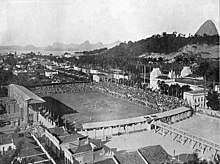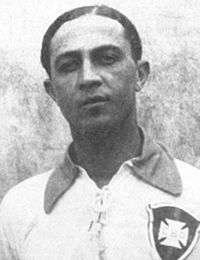1919 South American Championship Final
The 1919 South American Championship Final was the final match to determine the South American Cup champion. It was held on May 29, 1919, in Estádio das Laranjeiras of Rio de Janeiro.
 Estádio das Laranjeiras, venue of the final | |||||||
| Event | 1919 South American Championship | ||||||
|---|---|---|---|---|---|---|---|
| |||||||
| Date | May 29, 1919 | ||||||
| Venue | Estádio das Laranjeiras, Rio de Janeiro | ||||||
| Referee | Juan P. Barbera (Argentina) | ||||||
Brazil won the match against Uruguay 1–0 after two periods extra time, consisting of two halves of 30 minutes each.[1]
This meant the match lasted 150 minutes, the longest in the tournament's history, while Brazil won its first continental title.[2]
Overview
The 1919 Final was the first played not only in a South American competition but in an international football competition. The tournament system consisted of a single round-robin tournament, where the team with most points crowned champion. As Brazil and Uruguay finished tied on points, a final had to be held.
It was also the first time that a non-Conmebol referee (English Robert L. Todd) was appointed for enforcing the laws of the game during the match. After it finished 0–0, an extra time –consisting of two halves (30' each)– was played. In total, the match lasted 150 minutes, becoming the longest football match ever in Copa América.[3]
Arthur Friedenreich scored the goal that allowed Brazil to win its first international title.
Match details
| Brazil | 1–0 (a.e.t.)* | |
|---|---|---|
| Friedenreich |
Brazil
|
Uruguay
|
|
| ||||||||||||||||||||||||||||||||||||||||||||||||||||||||||||||||||||||||||||||||||||||
Aftermath

Friedenreich's goal had a huge impact in Brazil due to the fact that him was the first black men to have played football in that country. He was also the first black to be called for the national team. Although only better-off sectors in Brazilian society could play football by then, the Federation allowed Friedenreich to play due to his father was a German-native,[5] who had played in SC Germânia, a Paulist club established by German immigrants.[6]
Friedenreich was not only the first black men to play football in Brazil, he is considered the first black superstar of the sport, with more than 1,200 goals credited to him within 25 years of career.[6]
After this victory, racism in Brazilian football started to drop, with several clubs including black people in their squads and even the national team. The championship also contributed to increase the popularity of the sport in the country.
Nevertheless, President of Brazil, Epitácio Pessoa, banned black players from the national team so Friedenreich could not attend the 1920 and 1921 editions in Chile and Argentina respectively. After the failures in those tournaments and popular pressure, Pessoa had to lift the ban and Friedenreich (considered the best Brazilian player) could return to the team. Brazil could win its second South American title in 1922 although Friedenreich can only play two matches before being injured.[7]
References
- La subyugante historia de la Copa América
- Southamerican Championship 1919 by Martín Tabeira on the RSSSF
- Datos, historias y rarezas de la Copa América, El Gráfico, 17 June 2011
- Oliver, Guy (1992). The Guinness Record of World Soccer. Guinness publishing. p. 551. ISBN 0-85112-954-4.
- Arthur Friedenreich: The Original "Black" Pearl by Mr X on BleachReport, 19 Oct 2008
- Freidenreich on Duke University website
- El presidente racista que no aceptaba negros en su equipo, Infobae, 4 July 2011